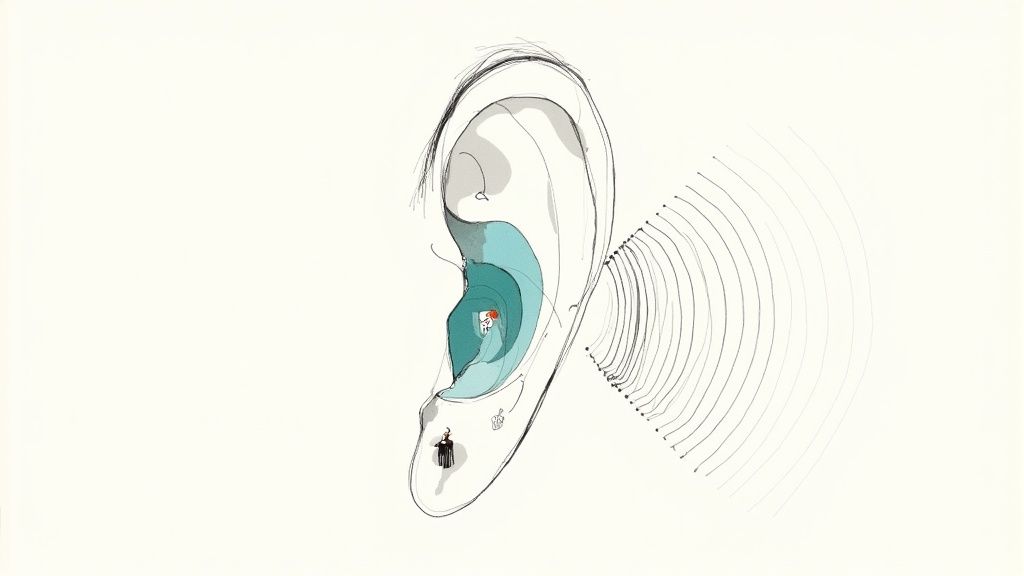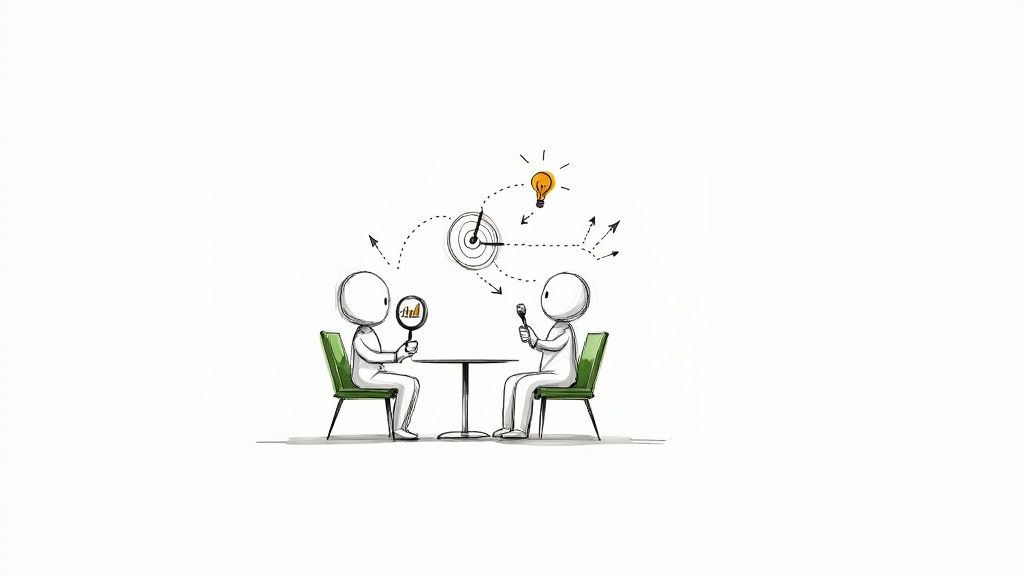10 Critical Soft Skills for Managers in 2025

In today's complex workplace, a manager's success is no longer defined solely by their technical expertise or ability to manage projects. The true differentiator lies in their ability to lead, influence, and inspire people. This pivot from task-oriented oversight to people-centric leadership underscores a fundamental shift in what organizations value. Our exploration into the new managerial playbook emphasizes the shift from purely technical abilities to a broader set of essential practical skills for effective leadership. These are the competencies that drive engagement, foster innovation, and build resilient teams.
Research consistently shows a strong correlation between a manager's soft skills for managers and key business outcomes. A study of textile firms in India found that a leadership and soft skills training program increased firm productivity by 17% (Source: IZA Institute of Labor Economics, Discussion Paper No. 12212). These are not just 'nice-to-have' traits; they are the essential tools that transform a good manager into a great leader.
This article breaks down the 10 most critical soft skills for managers, providing evidence-based insights and actionable strategies to cultivate them for immediate impact. You'll learn how to develop each skill with practical steps, moving beyond theory to real-world application.
1. Emotional Intelligence (EI)
Emotional Intelligence (EI) is the capacity to understand and manage your own emotions, and to recognize and influence the emotions of those around you. For managers, this is arguably one of the most crucial soft skills, as it underpins nearly every interaction, from giving feedback to navigating high-stakes negotiations. Popularized by psychologist Daniel Goleman, EI is not just about being "nice"; it's about being smart with feelings. A leader with high EI can build psychological safety, foster trust, and guide a team through change with greater stability and less friction.

A study published in the Journal of Leadership & Organizational Studies found a significant positive relationship between a leader's EI and their team's job satisfaction and performance (Miao, C., Humphrey, R. H., & Qian, S., 2016). Essentially, when a manager can self-regulate during a crisis or show genuine empathy for an employee's personal struggles, the entire team benefits. This translates into higher engagement, lower turnover, and a more resilient organizational culture.
How to Develop Emotional Intelligence
- Practice Self-Awareness: Start a simple daily journal. At the end of each day, write down one challenging interaction and identify the specific emotion you felt and what triggered it. This builds the muscle of recognizing your emotional state in real-time.
- Improve Self-Regulation: When you feel a strong negative emotion like frustration, use the "S.T.O.P." technique: Stop what you are doing, Take a deep breath, Observe your thoughts and feelings without judgment, and Proceed with intention.
- Enhance Empathy: In your next one-on-one, focus entirely on understanding your employee's perspective without formulating your reply. Ask clarifying questions like, "What was your thought process behind that decision?" to see the situation from their viewpoint.
By actively developing EI, managers can create a more supportive and effective work environment. To explore this topic further, you can learn more about Emotional Intelligence in leadership.
2. Communication Skills
Effective communication is the ability to convey information clearly, listen actively, and adapt messaging to different audiences. For managers, this is a foundational soft skill that serves as the primary vehicle for articulating vision, providing feedback, and building trust. It goes beyond simple transmission of information; it's about ensuring shared understanding and alignment. A manager with strong communication skills can prevent misunderstandings, boost productivity, and foster a transparent, high-trust environment.

According to the Project Management Institute's 2018 Pulse of the Profession report, ineffective communication was a primary contributor to project failure one-third of the time. When managers communicate with clarity and purpose, they empower their teams. For example, a leader who uses storytelling to explain a new company direction makes the vision more memorable and relatable than one who just presents data. Similarly, a manager who openly admits a mistake and explains the learnings fosters psychological safety and models accountability.
How to Develop Communication Skills
- Use a Feedback Framework: When giving feedback, use the "Situation-Behavior-Impact" (SBI) model. Describe the specific Situation, outline the observable Behavior, and explain the Impact it had. This makes feedback objective and actionable.
- Practice Active Listening: Implement the 70/30 rule in conversations: listen 70% of the time and speak only 30%. When listening, pause and ask clarifying questions like, "So, if I understand correctly, you're saying..." to confirm comprehension.
- Tailor Your Message: Adapt your communication style to the audience. A financial update for the C-suite requires a different approach than a project kickoff with your creative team. Consider the audience's priorities, knowledge level, and preferred communication channels.
By mastering these techniques, managers can ensure their message is not just heard, but also understood and acted upon. To gauge your team's proficiency, you can use a communication skills assessment.
3. Active Listening
Active listening is the practice of fully concentrating on what is being said rather than just passively hearing the words. It involves understanding, responding, and remembering the speaker's message. For managers, this is a foundational soft skill that builds trust, uncovers the root causes of problems, and makes team members feel genuinely valued and respected. Instead of formulating a reply while someone is speaking, an active listener focuses on comprehension, which prevents misunderstandings and fosters a culture of open communication.

The significance of this skill is highlighted in research from Google's Project Aristotle, a multi-year study on team effectiveness, which found that psychological safety was the most critical dynamic in successful teams (Source: re:Work with Google). Active listening is a primary driver of psychological safety, as it signals to employees that their contributions are welcome and their perspectives matter. When a manager puts away their phone during a conversation or paraphrases a concern by saying, "What I'm hearing is that you're worried about the timeline," they demonstrate respect and build a stronger, more collaborative team dynamic.
How to Develop Active Listening
- Paraphrase and Clarify: Before responding, repeat what you heard in your own words. Ask clarifying questions like, "Could you tell me more about that specific challenge?" to ensure you have a complete and accurate understanding.
- Use Silence Strategically: Don't rush to fill every pause in a conversation. Allowing for a few moments of silence gives the speaker time to gather their thoughts and often encourages them to share more detailed or valuable information.
- Validate Before Solving: Acknowledge the speaker's feelings or perspective before jumping to a solution. Simple phrases like, "That sounds incredibly frustrating," or "I can see why you feel that way," validate their experience and build rapport.
By mastering active listening, managers can transform their interactions from simple transactions into opportunities for connection and problem-solving. You can discover more techniques for effective listening to further enhance this crucial leadership skill.
4. Delegation and Empowerment
Delegation is more than just offloading tasks; it is the strategic assignment of responsibility to team members. Empowerment is the crucial second half of this equation, involving giving employees the authority, resources, and trust to execute those responsibilities effectively. For managers, mastering this soft skill is a force multiplier. It develops team capabilities, builds employee ownership, and frees the manager to focus on high-level strategic work that drives the team forward.

Research from Gallup's State of the American Manager report shows that managers who excel at delegation experience higher levels of team engagement and productivity. When a manager entrusts a high-potential employee to lead a key project, providing guidance without micromanaging, they are not just getting a task done. They are actively investing in that employee's growth, which boosts morale and retention. This practice transforms the manager's role from a taskmaster to a developer of talent.
How to Develop Delegation and Empowerment Skills
- Match Tasks to Development Goals: Don't delegate based solely on convenience. Assign tasks that align with an employee's career aspirations. For instance, if a team member wants to develop leadership skills, delegate the responsibility of running a weekly team meeting.
- Define Clear Parameters with SMART: Use the Specific, Measurable, Achievable, Relevant, and Time-bound framework to define the task's scope and expected outcome. This clarity prevents confusion and sets the employee up for success.
- Provide Support, Don't Hover: Establish regular, brief check-ins to offer guidance and remove roadblocks. This shows you are supportive without undermining their autonomy. Ask questions like, "What support do you need from me to succeed?" rather than "Show me what you've done."
5. Conflict Resolution and Negotiation
Conflict resolution is the ability to navigate disagreements constructively, finding solutions that satisfy all parties involved. Paired with negotiation, the skill of reaching mutually beneficial agreements, it is one of the most vital soft skills for managers. Leaders with this skill can mediate team disputes, handle difficult conversations about performance, and advocate for resources, preventing small issues from escalating into major organizational problems. They transform adversarial situations into opportunities for collaboration and growth.
A report by CPP Inc., publishers of the Thomas-Kilmann Conflict Mode Instrument, found that U.S. employees spend an average of 2.8 hours per week dealing with conflict, which the report estimated to cost businesses hundreds of billions of dollars annually (Source: "Workplace Conflict and How Businesses Can Harness It to Thrive"). When a manager can effectively facilitate a conversation between team members with opposing views or negotiate a win-win resource allocation between competing departments, they are directly saving time and preserving team cohesion. This skill builds a resilient culture where disagreements are seen as productive challenges, not personal attacks.
How to Develop Conflict Resolution and Negotiation Skills
- Focus on Interests, Not Positions: Use the "Getting to Yes" approach, developed at the Harvard Program on Negotiation. Instead of focusing on what each person wants (their position), ask "why" they want it to uncover their underlying interests. For example, if two employees want the same vacation week, their interest might be spending time with family, which could be solved in other ways.
- Separate the People from the Problem: Consciously reframe the issue as a shared challenge to be solved together, not a battle between individuals. Use language like, "How can we solve this issue with the project deadline?" This fosters a collaborative mindset.
- Practice Active Listening: When mediating, listen to understand, not to formulate a response. Repeat back what you've heard by saying, "It sounds like your main concern is..." This validates the speaker's feelings and ensures you accurately grasp the core issues before proposing solutions.
By honing these skills, managers can foster a more harmonious and productive environment. To deepen your understanding, you can explore more workplace conflict resolution strategies.
6. Decision-Making and Problem-Solving
Decision-making and problem-solving are intertwined skills that form the backbone of effective leadership. This dual capability involves systematically identifying challenges, analyzing information, evaluating potential solutions, and committing to a course of action. For managers, mastering these soft skills for managers means guiding teams past obstacles and making strategic choices that align with organizational goals. A manager who can navigate ambiguity and make sound, timely decisions inspires confidence and maintains momentum, even when faced with unexpected hurdles.
Research from McKinsey highlights that organizations with faster, better decision-making processes post returns to shareholders that are significantly higher than their peers (Source: "Decision making in the age of urgency," McKinsey & Company, 2019). When a manager uses a decision matrix to evaluate project vendors or employs a collaborative problem-solving framework like the 5 Whys to diagnose a recurring issue, they are not just fixing a problem; they are building a more resilient and efficient operational engine. This translates directly to improved productivity, innovation, and the ability to pivot quickly in a dynamic market.
How to Develop Decision-Making and Problem-Solving Skills
- Define the Problem Clearly: Before exploring solutions, articulate the exact problem you are trying to solve. Ask, "What does success look like if this is resolved?" This prevents a common pitfall: solving the wrong problem.
- Use Structured Frameworks: Employ established methods to guide your thinking. Use a SWOT analysis (Strengths, Weaknesses, Opportunities, Threats) for strategic choices or Edward de Bono's Six Thinking Hats to explore an issue from multiple perspectives.
- Embrace Data-Informed Judgment: Gather relevant data to inform your decision, but don't get paralyzed by the pursuit of perfect information. Make the best decision possible with the available facts, and be prepared to adapt as you learn more.
By deliberately practicing these techniques, managers can enhance their ability to steer their teams through complexity with clarity and confidence.
7. Feedback and Coaching
Feedback and coaching are twin skills that separate good managers from great ones. Feedback is the art of providing specific, constructive information about performance, while coaching is the practice of guiding an employee to discover their own solutions. For managers, mastering these soft skills transforms performance conversations from dreaded critiques into powerful developmental opportunities. Instead of just correcting mistakes, a manager who coaches and gives effective feedback builds an employee’s long-term capabilities and confidence.
According to research from Google's Project Oxygen, which identified the behaviors of the best managers, "is a good coach" was the number one characteristic (Source: re:Work with Google). This finding underscores that modern employees don't just want a boss; they want a leader invested in their growth. Effective coaching and feedback create a culture of continuous improvement, where employees feel safe to take risks and are motivated to learn, directly impacting team innovation and productivity.
How to Improve Feedback and Coaching
- Use a Structured Model: For difficult conversations, apply the "Situation-Behavior-Impact" (SBI) framework. Clearly state the Situation ("In this morning's team meeting..."), describe the specific Behavior ("...you interrupted a colleague..."), and explain the Impact ("...which disrupted the flow of the discussion.").
- Shift from Telling to Asking: Instead of dictating solutions, use powerful coaching questions. Ask, "What are your initial thoughts on how to approach this?" or "What would success look like for this project?" This empowers employees to think critically and take ownership.
- Make it Timely and Specific: Deliver feedback as close to the event as possible. Instead of a generic "good job," say, "The way you structured that client presentation made the data really easy to understand. Great work." This reinforces positive behaviors with clarity.
By developing these critical soft skills for managers, you can foster a proactive and highly engaged team. You can learn more about creating a feedback culture from Gallup's extensive research on the topic.
8. Team Building and Collaboration
Team building is the active process of turning a group of individual contributors into a cohesive, high-performing unit. Collaboration is the environment that allows this unit to thrive by integrating diverse skills and perspectives toward common goals. For managers, these are foundational soft skills for creating synergy, where the collective output far exceeds the sum of individual efforts. A manager skilled in fostering collaboration can build psychological safety, boost morale, and drive innovation.
Google's verifiable "Project Aristotle" study revealed that how a team works together is more important than who is on the team. The top predictor of success was psychological safety, a shared belief that the team is safe for interpersonal risk-taking (Source: re:Work with Google). When a manager intentionally creates cross-functional project teams or celebrates team achievements publicly, they are directly building the conditions for this safety and effective collaboration, leading to higher productivity and engagement.
How to Foster Team Building and Collaboration
- Establish Team Working Agreements: When a team is new or a project begins, collaboratively create a charter that outlines communication norms, decision-making processes, and how to handle disagreements. This creates shared accountability from the start.
- Create Opportunities for Informal Connection: Dedicate the first five minutes of a meeting to non-work check-ins or schedule optional virtual coffees. These small moments build the interpersonal trust necessary for professional collaboration.
- Use Retrospectives to Improve: Adopt a practice from Agile methodologies and hold regular team retrospectives. Ask three simple questions: "What went well?", "What could we improve?", and "What will we commit to changing for next time?" to foster a culture of continuous improvement.
By prioritizing these soft skills for managers, leaders can transform a collection of employees into a powerful, unified force. To dive deeper, you can explore Patrick Lencioni's model of team health.
9. Adaptability and Change Management
Adaptability is the ability to adjust your approach and behavior in response to new information, changing conditions, or unexpected obstacles. Paired with change management, the process of guiding a team through organizational transition, it becomes one of the most vital soft skills for managers in today's volatile business landscape. A manager skilled in this area can steer their team through uncertainty, reduce resistance, and maintain productivity and morale when the ground is shifting beneath them. This skill ensures that pivots, whether in strategy, technology, or structure, are seen as opportunities rather than threats.
Change management models like John Kotter's 8-Step Process for Leading Change emphasize that successful transformations are heavily dependent on leadership. For example, in his book Leading Change, Kotter cites numerous case studies showing how a lack of leadership and clear communication can derail major change initiatives. A manager who can proactively guide their team through a strategic pivot is actively managing change by keeping the team aligned and motivated. This prevents the performance dips and employee disengagement that often accompany poorly managed transitions, helping the organization remain agile and competitive.
How to Develop Adaptability and Change Management
- Communicate the "Why": Before implementing any change, clearly and repeatedly explain the reasons behind it. Connect the transition to the team's goals and the company's mission to foster understanding and buy-in.
- Involve the Team in Planning: Whenever possible, include your team members in the change process. Ask for their input on how to implement new workflows or systems. This creates a sense of ownership and reduces feelings of powerlessness.
- Break Down Large Changes: Introduce significant changes in smaller, manageable phases. For example, when adopting new software, start with a pilot group or roll out one feature at a time. Celebrate the small wins at each milestone to build positive momentum.
10. Accountability and Performance Management
Accountability is the practice of establishing clear expectations and ensuring commitments are met, while performance management is the ongoing process of setting goals, tracking progress, and providing feedback. For managers, these interconnected soft skills create a framework where team members clearly understand their roles, see how their work contributes to larger objectives, and receive fair, consistent evaluation. A manager skilled in this area fosters a culture of ownership and high performance, moving beyond simple task delegation to genuine empowerment and results.
A Gallup study on performance management revealed that when managers hold regular meetings with employees, those employees are almost three times more likely to be engaged at work (Source: "Re-Engineering Performance Management," Gallup, 2017). This demonstrates that accountability isn't about top-down enforcement; it's about a consistent, supportive dialogue. When a manager uses a system like OKRs (Objectives and Key Results) to align individual goals with company targets and follows up with regular check-ins, they create transparency and motivate the entire team.
How to Develop Accountability and Performance Management
- Set Clear, Focused Priorities: Instead of a long, overwhelming task list, define 3-5 key priorities for each team member per quarter. Use measurable metrics for quantitative goals and create clear qualitative descriptions for softer outcomes.
- Establish a Consistent Cadence: Replace the annual "surprise" review with frequent, low-stakes check-ins. Monthly or quarterly conversations to discuss progress, roadblocks, and support needs are far more effective.
- Make Feedback a Two-Way Street: Frame performance conversations as dialogues, not monologues. Ask questions like, "What resources do you need to succeed?" or "How can I better support you in this goal?" to encourage shared ownership.
By mastering accountability, managers ensure that goals are not just set, but achieved. To build a robust system, you can explore these performance management best practices.
Soft Skills for Managers: 10-Point Comparison
| Skill | Implementation Complexity 🔄 | Resource Requirements ⚡ | Expected Outcomes 📊 | Ideal Use Cases 💡 | Key Advantages ⭐ |
|---|---|---|---|---|---|
| Emotional Intelligence (EI) | High — ongoing self-reflection and practice 🔄 | Medium — time, coaching; low material cost ⚡ | Stronger relationships; higher retention; better decisions 📊 | People management, cultural change, conflict-prone teams 💡 | Builds trust and inclusion; reduces conflict ⭐ |
| Communication Skills | Medium — training + consistent practice 🔄 | Medium — training, meeting time, feedback loops ⚡ | Fewer misunderstandings; alignment; improved productivity 📊 | Cross-team coordination, strategy rollout, feedback sessions 💡 | Clearer messaging; stronger trust; better knowledge transfer ⭐ |
| Active Listening | Medium — habit change; time-intensive 🔄 | Low — attention and time; minimal tools ⚡ | Uncovers root causes; higher engagement; fewer escalations 📊 | One‑on‑ones, coaching, conflict de‑escalation 💡 | Builds trust; reveals hidden issues early ⭐ |
| Delegation & Empowerment | Medium — planning, matching skills, oversight 🔄 | Medium — training, time for handover and checkpoints ⚡ | Increased capacity; skill growth; succession pipeline 📊 | Scaling teams, developing talent, workload distribution 💡 | Multiplies manager impact; develops employees ⭐ |
| Conflict Resolution & Negotiation | High — neutral facilitation and emotional skill 🔄 | Medium — training, mediated time, frameworks ⚡ | Reduced tension; creative, durable solutions 📊 | Team disputes, resource allocation, stakeholder conflicts 💡 | Prevents escalation; models healthy conflict management ⭐ |
| Decision‑Making & Problem‑Solving | Medium — frameworks + data + stakeholder input 🔄 | Medium — data, analysis time, facilitation ⚡ | Better strategic choices; faster problem resolution 📊 | Strategic planning, complex trade-offs, prioritization 💡 | More effective outcomes; reduces wasted effort ⭐ |
| Feedback & Coaching | Medium — regular cadence and skill development 🔄 | Medium — one‑on‑one time, coaching training ⚡ | Accelerated development; improved performance and engagement 📊 | Performance improvement, career development, behavior change 💡 | Accelerates learning; builds capability from within ⭐ |
| Team Building & Collaboration | Medium — ongoing facilitation and norm-setting 🔄 | Medium — events, rituals, facilitation time ⚡ | Higher morale; innovation; improved retention 📊 | New teams, cross‑functional projects, innovation sprints 💡 | Boosts creativity, cohesion, and cooperation ⭐ |
| Adaptability & Change Management | High — planning, stakeholder engagement, sequencing 🔄 | High — training, communication, leadership bandwidth ⚡ | Smoother transitions; resilient and agile teams 📊 | Transformations, tech adoption, restructures 💡 | Reduces resistance; preserves performance during change ⭐ |
| Accountability & Performance Management | Medium — processes, metrics, and documentation 🔄 | Medium — systems, regular reviews, measurement tools ⚡ | Clear expectations; improved results; fair recognition 📊 | Goal alignment, performance improvement, promotions 💡 | Clarifies priorities; supports fair advancement ⭐ |
From Theory to Practice: Embedding Soft Skills into Your Leadership DNA
The journey through the essential soft skills for managers, from emotional intelligence to accountability, reveals a powerful truth: effective leadership is fundamentally human. While technical skills and industry knowledge can open the door to a management role, it is the mastery of these interpersonal competencies that determines a leader's long-term success and the success of their team. These are not just "nice-to-have" attributes; they are the core mechanics of creating engaged, resilient, and high-performing work environments.
The skills we have explored, including active listening, delegation, and conflict resolution, are not independent tools but an interconnected system. Strong emotional intelligence fuels better communication. Clear communication is the foundation for effective feedback and coaching. And a manager who excels at coaching is better equipped to foster collaboration and manage change. The compounding effect of developing these skills transforms a manager from a simple task-assigner into a true catalyst for growth and innovation.
Your Action Plan for Continuous Growth
Mastering these soft skills for managers is not a destination but a continuous journey of self-improvement. Merely understanding these concepts is not enough; the real value comes from consistent, intentional application.
To translate this knowledge into tangible results, consider the following steps:
- Identify Your Focus Area: Rather than trying to improve all ten skills at once, select one or two that will have the most immediate impact on your team. Use the self-reflection points in each section to guide your choice. Is communication breakdown a common issue? Start there. Is team morale low? Focus on feedback and team building.
- Seek Deliberate Feedback: Actively solicit input on your chosen skill. Ask your team, peers, or a mentor for specific, observable feedback. For example, you could ask, "In our last project meeting, how could I have been a more effective listener?" This creates a powerful loop of practice and refinement.
- Commit to a Learning Path: True development often requires a structured approach. For comprehensive programs focused on enhancing leadership capabilities, exploring avenues for ongoing Leadership Development is essential for turning potential into proficiency.
The Organizational Imperative
For organizations, nurturing these capabilities is a strategic investment. While specific revenue figures can vary widely, a large body of research supports the financial benefits of strong leadership. For example, a 2015 study by Korn Ferry found that companies with highly engaged employees, a key outcome of effective management, achieve 2.5 times more revenue growth than competitors with low engagement levels. This highlights that building a cadre of leaders proficient in these areas directly correlates with business outcomes, from employee retention and engagement to profitability and innovation.
Ultimately, investing in the soft skills of your managers is an investment in your people and your culture. It’s a commitment to creating a workplace where individuals feel heard, valued, and empowered to do their best work. As you embed these skills into your leadership DNA, you are not just becoming a better manager; you are building a more resilient, dynamic, and successful organization for the future.
Ready to build a leadership team with the right soft skills from the start? MyCulture.ai helps you assess candidates for crucial competencies like communication, problem-solving, and adaptability during the hiring process. Discover how our platform can help you identify and hire managers who are a perfect fit for your culture and poised for success by visiting MyCulture.ai.